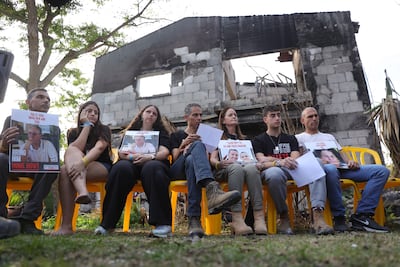Live updates: Follow the latest news on Israel-Gaza
Human rights and peace advocates in Israel were already facing an uphill struggle before Palestinian militant group Hamas launched its attack on October 7.
Almost exactly a year ago, voters elected the most right-wing government in the country’s history led by Prime Minister Benjamin Netanyahu.
Mr Netanyahu filled key positions in his cabinet with far-right politicians, including one convicted of terror charges, who oppose a peaceful political settlement with the Palestinians and support the full annexation of the occupied West Bank.
Meretz, a left-wing party closely associated with Israel’s peace and human rights movement, did not even pass the electoral threshold.
After the October 7 attacks, in which Hamas rampaged through southern Israel killing about 1,200 people and kidnapping 240, most of whom were civilians, official Israeli and social media were quickly awash with militaristic content.
An end to the Israel-Palestine conflict has perhaps never felt so distant.
Peace and human rights activists have spoken to The National about how their work changed that day and why their perspectives must be heard as Israel’s campaign in Gaza, which has killed almost 20,000 Palestinians, continues.
Dror Sadot, a spokeswoman for leading Israeli human rights organisation B'Tselem, says October 7 was a terrible demonstration of what activists such as herself had been seeing alone for some time.
“We were the people who knew the situation on the ground and how bad it was,” she says.
“The status quo or Gaza being ‘quiet’ [before October 7] did not mean things were actually calm, it just meant that Israel’s apartheid was continuing.”
Her work has become harder since the attacks but pales in comparison to what her colleagues in Gaza are going through, Ms Sadot says.
“As a Jewish-Israeli I feel safe, even though it’s harder to speak out and protest,” she says. "The ones who are really in danger are the Palestinians in the West Bank and Gaza.
“We’ve been condemned by the public and officials. It’s part of the job and doesn’t surprise us but the volume is definitely higher than we can ever remember.
“It doesn’t stop us and it’s really the least of our problems. We have three researchers in Gaza with families who have lost relatives. We have friends and family that were harmed by the Hamas attacks.
“People are hurting but we’re staying loyal to human rights. It is our job and what guides us.”

Concerns over rise in settler violence
Dror Etkes, an expert on illegal Israeli settlements in the West Bank, says he now confronts danger that was not there before October 7.
Settler violence against Palestinians in the West Bank has since rocketed as the regular military has turned its attention to Gaza.
Settlers, who have now been drafted to protect their communities, stand accused of numerous human rights violations, including attacking Palestinians and forcing entire communities to permanently leave their land.
“Contact with settlers is more hostile," Mr Etkes says. "They now have the authority to detain you because they’ve been recruited to the military since October 7."
Mr Etkes has been detained twice already.
“They were different experiences to previous interactions with the Israeli military, with soldiers who weren’t settlers,” he says.
“It’s clear these new guys have an agenda and are way more hostile.”
The impact of October 7
Matan Rosenstrauch, a peace activist who works at the UK-based Balfour Project, says the horror of October 7 and Israel’s response has taken a huge toll on the peace movement.
A few days after the Hamas attacks, he shared a post from an Israeli-Arab saying not all Palestinians supported Hamas. A family member told him to take the post down or he would “lose his family”.
“It shows how sensitive you have to be, especially when some of your family members have survived these atrocities,” Mr Rosenstrauch says.
His father survived Hamas’s attack on Kibbutz Be’eri, which killed more than 130 people.
Many of the communities near the Gaza border were some of southern Israel's most left-leaning constituencies, including Be'eri and Nir Oz. Prominent peace activists were among the hundreds killed and kidnapped.
The first hostage to be freed by Hamas, Yocheved Lifshitz, was an 85-year-old left-wing activist based in Nir Oz who had worked with Palestinians in Gaza. Her husband, who remains in captivity, had worked driving Gazans to hospitals in Israel.

“A friend asked me whether if I had lost my father, would my position be different? It’s hard to say, but if you take people like Maoz Inon, who lost both his parents, or Neta Heiman from Women Wage Peace who had her mother kidnapped and returned, they haven’t changed,” he says.
“We on the left always said the status quo is not sustainable, although we never imagined something as bad this,” he says. "It is the result of putting your head in the sand.
“My dad, his fellow survivors and the people who were murdered are victims of a government that tried to make us believe that the status quo is sustainable and the only option.”


